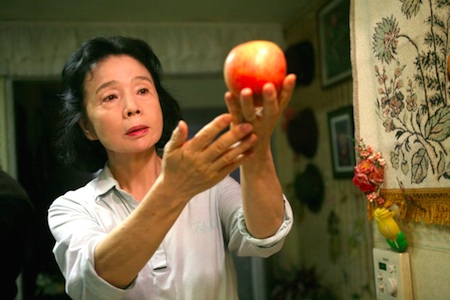Let’s talk about sex. More so, let’s talk about how a particular sex scene in one film underscores so much of what has been important about the revitalization of South Korean Cinema. The specific scene I’m talking about is the one of sexagenarian sex in Lee Chang-dong‘s Poetry from 2010.
The film follows Mi-ja (played by veteran actress Yun Jung-hee), a woman in her late 60s who is diagnosed with Alzheimer’s. She begins taking a poetry class, perhaps because words become even more important when you begin to lose the ability to recall them. At this same time a horrific incident takes over her life. She may forget things, she may appear awkward in certain social situations, but the sex scene demonstrates she still has her wits about her when the moment calls for it.
Mi-ja has sex with Mr. Kang, the stroke-victim for whom she provides in-house care. He has hoped his daily bathing at the hands of Mi-ja would lead to sex, one day popping an erectile dysfunction pill beforehand. This pill-popping to get the penis-propping results in Mi-ja storming out, but she returns resolute after a few days.
The sex scene begins at 87:58, but the motivation begins elsewhere. The primary tension within the film surrounds the revelation that her young grandson participated in a horrible act with a group of his peers. As a result of the act, the parents of the boys negotiate a payment with the victim’s family to keep the police at bay. Mi-ja, however, finds herself identifying more with the victim than the perpetrators. She seeks a means to understand what happened.
That means is through her body. From the intimate violence of the bathroom knife attack in Green Fish and the interrogation scene in Peppermint Candy, to the palsied body of Gong-ju in Oasis and the grief-stricken Shin-ae’s sustained, full-bodied crying in the Pentecostal pews of Secret Sunshine, the experience of trauma through our bodies has been a core aspect of Lee’s work. Here in Poetry, the sex scene is where the body experiences trauma, but it is unlike any other other.
Mi-ja has sex with Mr. Kang, the stroke-victim for whom she provides in-house care. He has hoped his daily bathing at the hands of Mi-ja would lead to sex, one day popping an erectile dysfunction pill beforehand. This pill-popping to get the penis-propping results in Mi-ja storming out, but she returns resolute after a few days. Although the encounter enables a possible blackmail later, as Robert Koehler noted in Cinema Scope, she is returning to experience someone else’s trauma. The scene within a larger sequence I’m focusing on begins at 87:58, where we are shown behind the closed bathroom door. Mi-ja and Mr. Kang face each other in the large bathtub, yet at no time will they mutually look at each other, making this moment of nakedness a space of failed intimacy.
We begin behind Mi-ja where we can see Mr. Kang’s slightly paralyzed face, as if he’s in a constant state of orgasm. We can make out that Mi-ja is masturbating Mr. Kang. The shot shifts to Mi-ja’s left for profiles of both. Mr. Kang looks at Mi-ja but she won’t return his gaze. Then we are taken back behind Mi-ja as she takes off her slip, bra and underwear. Mi-ja mounts Mr. Kang. The intercourse proceeds with a slow, constant rhythm. We see Mi-ja’s expressionless face. We cut back to Mr. Kang’s face. Then we return to Mi-ja’s face, but this time with a different look in her eyes. They appear ever so slightly moist. Mi-ja’s eyes are expressing a deep emotion yearning from inside. Mi-ja engages in a tender gesture, taking Mr. Kang’s face in her hands. But when the camera cuts again to Mr. Kang, his eyes look above. It’s as if Mi-ja ever so briefly wanted to find humanity embraced. Soon, by 90:18, we cut to Mi-ja weightedly walking home.
This scene is not erotic, but nor is it dirty. Happening in a bathroom where Mr. Kang is washed beforehand, it’s almost a cleansing act of despair. (And considering South Korean cinema of the ’70s and ’80s regularly thrust rape scenes at us, can we see Mi-ja’s control in this scene as a shamanic cleansing ritual of this cinematic past?) By portraying a sex scene between two sexagenarians, Lee hasn’t done anything new for South Korean cinema. Park Jin-pyo’s 2002 documentary Too Young To Die paved this path with two septuagenarians. But Lee does expand the medium by including in the act an actor with a disability. (Kim Hi-ra is partially paralyzed in real life.) Although the If You Were Me series of human rights omnibus films from South Korea have regularly included actors with disabilities, Lee has been particularly insistent on placing disabled characters in his narratives. His first three films each had characters with the same condition, cerebral palsy. Lee’s work with the disabled and other outcasts is part of a confrontational cinema in search of humanity, asking South Koreans to see how they treat the proverbial square pegs in the round holes of society. And this emerging tradition is what grabbed and maintained my interest in South Korean cinema back in 1997. Lee’s films give his outsider characters the dignity that society has stripped away from them. In Poetry, it is a scene of bodies stripped naked where we find Mi-ja’s dignity returned.




